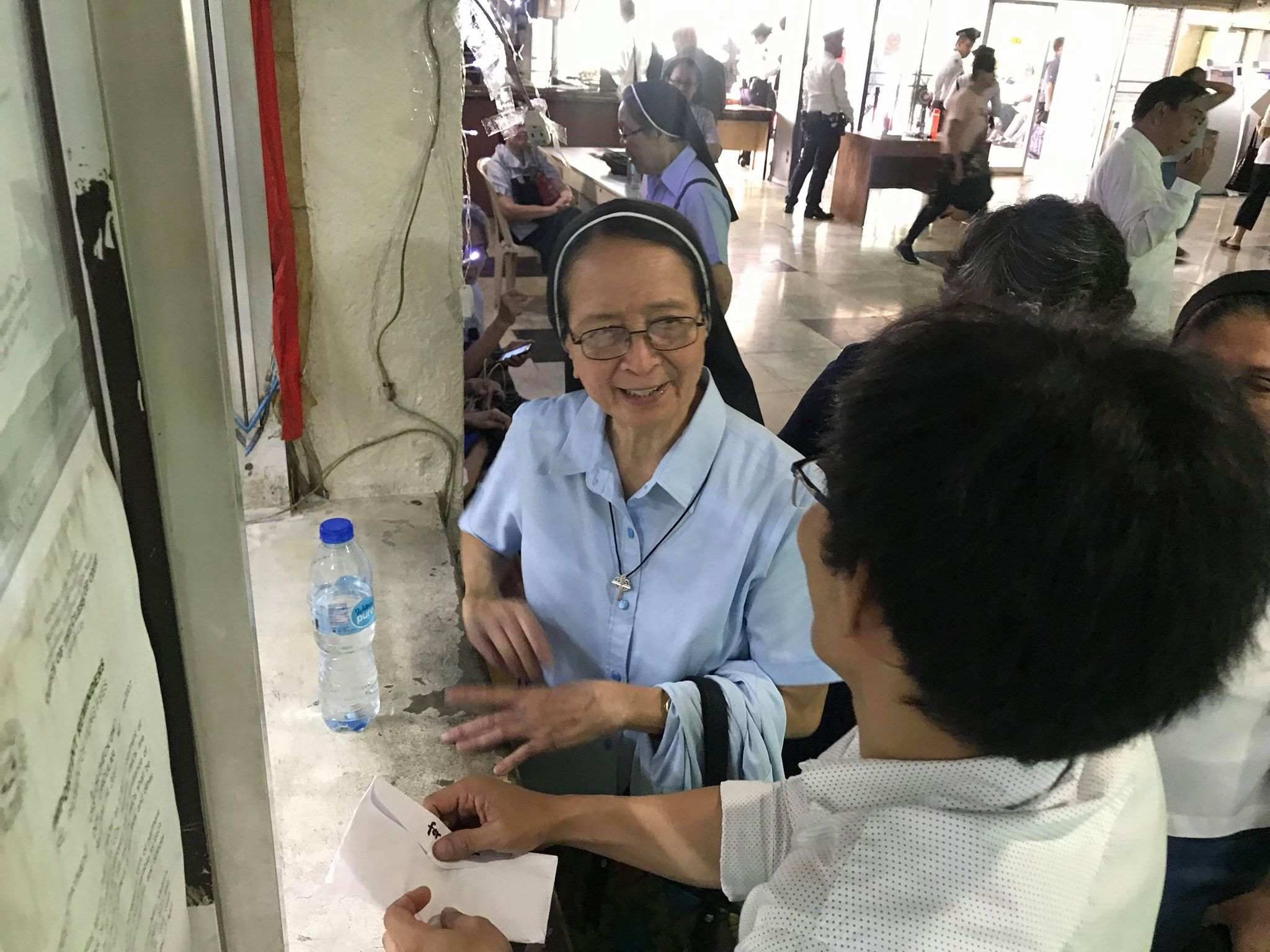SUMMARY
This is AI generated summarization, which may have errors. For context, always refer to the full article.

Sister Elenita Belardo was not only charged with perjury related to a suit by President Rodrigo Duterte’s national security adviser, Hermogenes Esperon Jr, but her group, Rural Missionaries of the Philippines (RMP), also lost access to its own bank accounts – all based on the accusation that RMP is funding communist rebels.
The RMP, a 50-year-old, non-profit run by nuns that does grassroots work with the rural poor, has suffered the financial brunt of the Duterte government’s intense campaign against communism. Its assets were frozen even before the enactment of the feared anti-terror law.
The nuns’ lawyers, the Public Interest Law Center, told the Supreme Court in a recent pleading that if the law were to be upheld, the nuns would most definitely be designated as terrorists and subjected to more sanctions.
The RMP has not been declared terrorists by any court. Belardo’s perjury charge was Esperon’s countersuit because the nun joined a petition for a protective writ, alleging harassment by the army.
“In the present factual milieu, many of those who dare [speak] out against the government or even just on social issues are vilified in public. Right now, the Anti Terror Act can be a masterful weapon that can be wielded against them,” the PILC said in a manifestation sent to the Supreme Court Monday, November 16.
The PILC reiterated its request for the Supreme Court to immediately issue an injunction against the law, which was enacted way back July.
“If before the Anti-Terror Act, the government can cause the freezing of bank accounts of a religious group, mostly used in long-term projects for schools in the poorest areas of the Philippines, funded and audited by international groups, what more now?” PILC’s Kristina Conti said in a statement Thursday, November 19.
AMLC starts freezing the accounts
The RMP has long been a target of General Antonio Parlade, spokesperson of Duterte’s national task force to end local communist armed conflict (NTF-ELCAC). Parlade has appealed to RMP’s European funders to stop giving the group grant money, accusing the nuns of financing the communist New People’s Army (NPA).
On December 26, 2019, the AMLC froze 3 of RMP’s bank accounts. PILC’s records show it was the National Intelligence Coordinating Agency (NICA) that petitioned the AMLC to do so.
AMLC’s legal basis is Republic Act 10168 or the terrorism financing prevention and suppression act, enacted in 2012 after former president Gloria Arroyo’s Human Security Act, the old law now replaced by a harsher anti-terror law.
Under RA 10168, AMLC is authorized to freeze assets on its own determination, but only for 20 days. To extend this, it must file a petition with the Court of Appeals (CA).
According to PILC’s Rachel Pastores, RMP was further surprised when its bank branch in Quezon City froze not just 3, but 5 of its accounts without showing that the other two were also allegedly used to finance the NPA.
When the 20-day period lapsed, the accounts remained frozen. The bank told RMP it could not unfreeze the accounts without a notice from AMLC, according to Pastores.
It turned out there was already a petition to extend with the CA, but the nuns were not notified, according to Pastores.
On February 26 this year, the CA not only granted the extension, but included 12 more accounts covering those owned by RMP-Northern Mindanao Region (NMR), which is a separate corporate entity.
What’s their basis
“Supporting their statements linking the funds to the CPP-NPA were voluminous pages of bank documents which merely show legitimate financial transactions of an organization on their administrative and operational expenses,” the PILC said in its Supreme Court manifestation.
The government’s bases for freezing RMP’s assets are the testimonies of two people who claim to be rebel “surrenderees.” In its ongoing campaign against more progressive groups, the military continues to use surrenderers to link groups to the underground NPA.
The RMP had flatly denied such an accusation.
The RMP began filing pleadings in court to lift the freeze order around July this year, but come September, its lawyers were notified that the AMLC had filed an additional petition for civil forfeiture.
On October 7, 2020, with the anti-terror law already in effect, Manila Regional Trial Court (RTC) Branch 37 Judge Virgilio Macaraig froze 10 bank accounts worth around P14 million. Judge Macaraig also froze 5 bank accounts of RMP-NMR worth around P950,000.
These are accumulated funds from local and international grantors, mostly from Europe, to finance the group’s ongoing projects for the rural poor, including setting up schools for Lumad communities.
Judge Macaraig cited in his decision an incident in October 2019, where RMP-NMR’s financial officer was arrested during a search in Butuan after a tip that they were helping the NPAs in the area.
Searches in the offices of progressive groups have been part of the Duterte playbook, and among those arrested and still detained is Reina Mae Nasino whose newborn baby’s death put the inadequacies of the judiciary under the spotlight.
Where the anti-terror law comes in
Under the anti-terror law, the executive anti-terror council (ATC) of which Esperon is vice chairman, has the power to decide on its own to designate a person or a group as a terrorist. It doesn’t need court permission to do so.
Once it designates the group, the AMLC has the authority to freeze assets. Designated people and groups will also be posted on the internet as terrorists.
In a Senate hearing in October, AMLC Executive Director Mel Racela admitted that they “lack the investigative powers” to perform such a function.
Racela said it would help if they have the power to subpoena people and documents to help them with this power – but that is an authority enclosed in a bill still being deliberated on by Congress.
Still, the anti-terror law already gave both the ATC and the AMLC this power. Senators in that hearing called this power too broad, even though they voted for the anti-terror law.
“Under these circumstances, the designation as a terrorist organization of the Petitioners is not just a possibility, it is a foregone conclusion unless the Honorable Court declares the Anti-Terror Act as unconstitutional,” PILC told the Supreme Court.
The PILC reiterated that there is no pending proscription case against the RMP. Proscription is a distinct power of the court under the anti-terror law to declare someone a terrorist. It is a separate power from designation, which is exclusively the anti-terror council’s.
“The case of the RMP is pending and has nothing to do with the proscription of the said group as a terrorist organization. Yet, even while the case is pending, petitioner RMP has been maliciously and publicly maligned as a terrorist organization or a supporter of a terrorist organization,” said PILC.
Can designated people be arrested?
Other petitioners have expressed fear that a designation can be used as basis for law enforcers to arrest them without a warrant, and detain them for as long as 24 days, or potentially indefinitely.
Justice Undersecretary Adrian Sugay said that designation is “really more for purposes of going after assets” and not for arresting and detaining. Justice Secretary Menardo Guevarra is a member of the anti-terrorism council.
Sugay said the council “will be more thorough and deliberate” than the NTF-ELCAC.
Those reassurances are not enough for petitioners who have been filing reiterative motions back and forth asking the Supreme Court to immediately issue a TRO.
“Because the Anti-terror act decrees most of the proceedings be made ex-parte, the persons or organizations subject of these investigations will have neither the time nor opportunity to seek appropriate relief,” Conti said.
“That the Anti-terror act can cause irreparable damage to lives, reputations, private properties is one of our driving force to ask for its voiding before it is too late for many of us,” Conti added.
The 37 groups of petitioners will meet with the Supreme Court on November 26 for a preliminary conference, but the question of whether it will be in person or virtual is still unresolved.
While petitioners wait, two Aetas from Zambales have already been charged with terrorism in a first publicly known case of the heavily contested law. They are still being detained. – Rappler.com
Add a comment
How does this make you feel?
![[Judgment Call] Who’s after Quiboloy? The media should be.](https://www.rappler.com/tachyon/2024/04/judgement-call-quiboloy-media-2.jpg?resize=257%2C257&crop=484px%2C0px%2C1080px%2C1080px)


![[Judgment Call] Is Rappler an ‘enabler’ of Catholic ‘copycats’?](https://www.rappler.com/tachyon/2024/04/catholics-copycats-april-18-2024.jpg?resize=257%2C257&crop=418px%2C0px%2C1080px%2C1080px)

There are no comments yet. Add your comment to start the conversation.